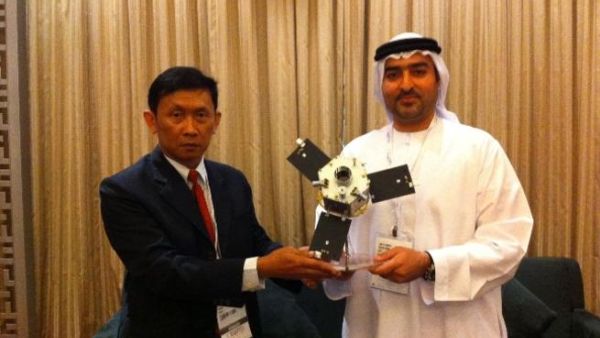EIAST signs MoU with Thailand’s GISTDA to strengthen cooperation in space technologies and application

The Emirates Institution for Advanced Science & Technology (EIAST) has signed a Memorandum of Understanding (MoU) with Thailand’s Geo-Informatics and Space Technology Development Agency (GISTDA) to further strengthen cooperation in the fields of space technology and application.
The two organisations will work together on various areas including remote sensing, space sciences, satellite communications, satellite navigation, satellite technology development and application and ground infrastructure development and its utilisation.
His Excellency Mr Ahmed Obaid Al Mansoori, Director General of EIAST, and Dr Somchet Thinaphong, Chairman of GISTDA, signed the agreement at Abu Dhabi National Exhibition Centre (ADNEC).
His Excellency Al Mansoori said: “The MoU with GISTDA underscores the global collaborations fostered by EIAST in knowledge sharing and building our competencies. GISTDA has strong accomplishments in the space technology sector and through our joint efforts we can leverage each other’s strengths for space technology applications that benefit people all over the world.”
Dr Thinaphong said: “We are honoured to partner with EIAST, which has demonstrated its competencies in space technology and research. The MoU will help us to address key areas in space technologies through collaboration and mutual sharing of knowledge.”
As per the MoU, the cooperation will extend towards implementation of joint research and development activities; exchange of related data; participating in production, development and launch of satellites; training of scientific specialists; preparation of joint conferences; exchange of scientists and formation of technical collaborative projects.
EIAST had launched DubaiSat-1 in July 2009, and since then has been transmitting satellite images that are of great value in several areas. Its relatively high spatial resolution complements existing Geographic Information System (GIS) databases and enables more efficient monitoring and prediction of natural hazards such as sandstorms, observation and fog forecast; predicting sand storms; and identifying the quality of water in the Gulf region.
EIAST is currently preparing to launch DubaiSat-2 and preparations have now reached the Critical Design Review (CDR) stage after completing preliminary design reviews. The second mission will be a totally new design developed by EIAST and Satrec Initiative of South Korea and it will produce higher and better quality image data.






